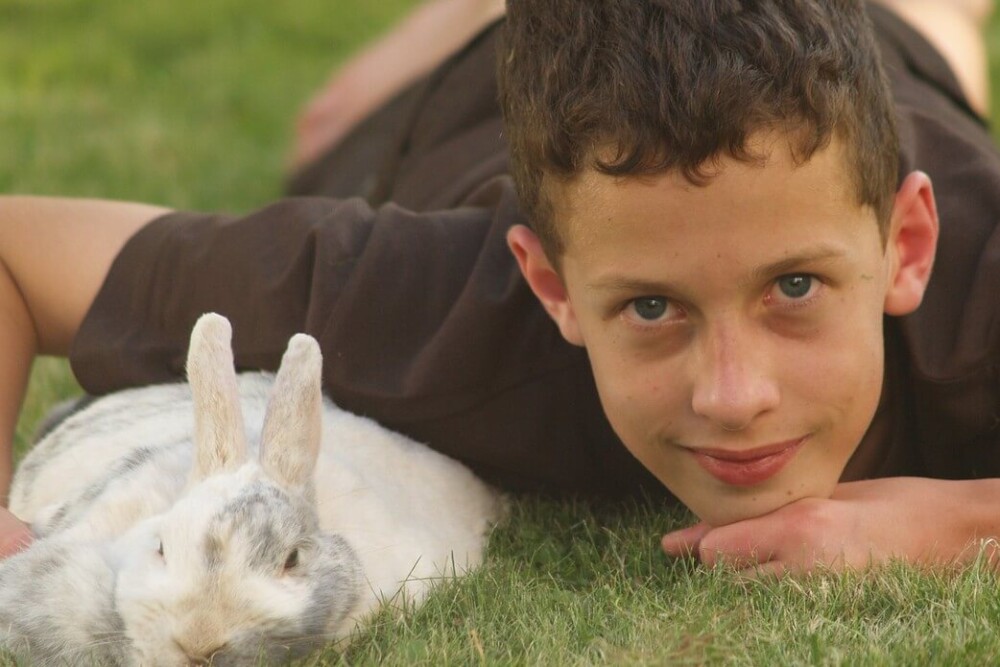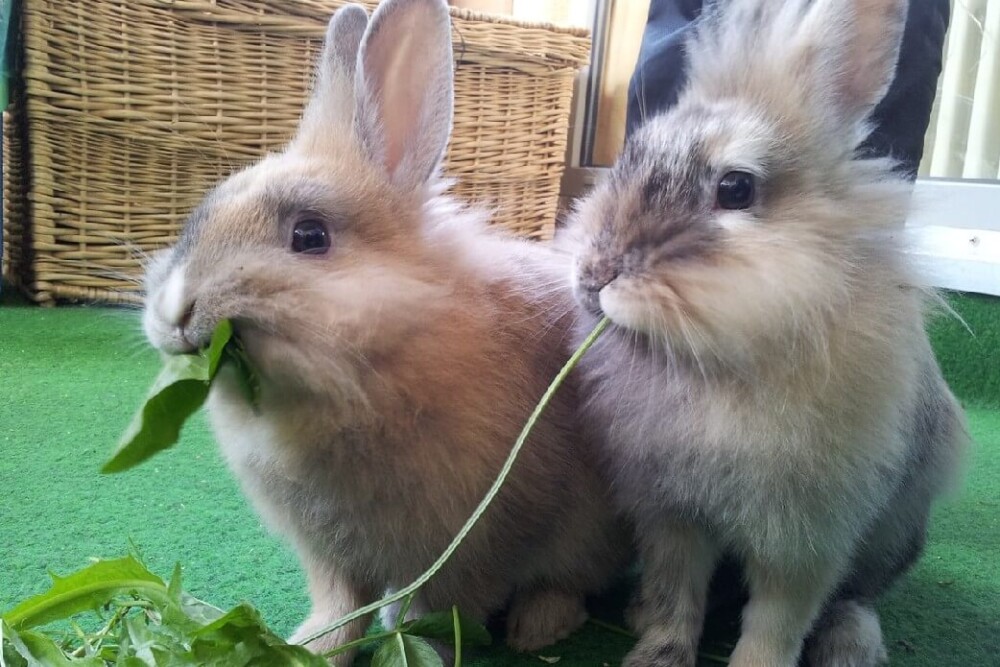New rabbit owners are often surprised to learn foods their bunny shouldn’t eat. Many of these foods are healthy for people, but dangerous for rabbits. For example, most of the leafy greens are healthy, but cabbage is not suitable for rabbits.
What foods can’t my rabbit eat? Avocados and chocolate are incredibly toxic to rabbits. All nightshade plants are poisonous, including tomatoes, peppers, eggplant, and tobacco. Bulb flowers, including daffodils and tulips, are toxic. All meat is indigestible by rabbits and will make them sick. Nuts and seeds have high-fat content and should not be fed to rabbits. Never feed rabbits processed foods because of their high sugar and fat content, including pastries, breads, yogurt, or peanut butter.
Other foods on this list may be controversial, with some people feeding it to their rabbits while others avoid it. I’ve included controversial items on this list and noted when a possible exception exists. Controversial foods are poisonous during most of the growth stages of the plant or when most of the plant is toxic to rabbits. Check out 80 healthy foods for rabbits.
The below list includes a range of dangerous and controversial fruits, vegetables, and nuts.
- Cabbage is high in potassium and fiber but falls on the controversial list due to the high amount of sulforaphane. Some rabbits cannot digest it properly.
- Cashews can be very controversial in the rabbit world. Some owners will offer them a rare treat, while other owners will avoid them entirely due to the fat content.
- Cauliflower is a controversial vegetable because it causes bloat and extreme gastrointestinal distress in some, but not all, rabbits.
- Corn of all types is usually seen as dangerous because it causes an excess buildup of gasses in your rabbit’s stomach. Fresh, dried, or canned corn should all be avoided.
- Iceberg Lettuce is very low in nutrition and offers nothing to your rabbit. Avoid iceburg lettuce at all times due to there being so many better lettuce options.
- Onions Always avoid onions as a food option because of onions cause red blood cell damage and hemolytic anemia in almost all rabbits.
- Parsnip can be controversial and will depend on the individual rabbit owner. They are very high in sugar, so if fed should be highly moderated.
- Peanuts pose a choking hazard, and you should avoid them. Additionally, the high-fat content is challenging for rabbits to digest correctly.
- Peas have a very high sugar content and are considered controversial. Some rabbit owners feed fresh peas as a snack. Dried peas can cause intestinal blockages.
- Potatoes are controversial due to being in the Nightshade family. The general consensus is the potato itself is safe for rabbits, but you should always avoid the leaves and stems.
- Rhubarb should always be avoided. It contains a large amount of oxalates that can cause diarrhea, dehydration, oral distress and weakness in all rabbits.
- Sweet Potatoes are super poisonous to rabbits. Never feed them to your rabbit.
- Walnuts are very high in fat and can cause gastrointestinal distress, so they are generally avoided. Some owners do feed them to their rabbits on occasion as a treat.
Dangerous Garden and House Plants
Letting your rabbit roam around your house or enjoy time outdoors is a great way to beat boredom and bond with your bunny. Just like you, your rabbit enjoys a change of scenery now and then. However, there are several plants that you may have indoors or grow in your yard or garden which can be extremely dangerous to your bunny.
- Seeds should usually not be fed to rabbits, even when the plant is edible. Seeds often contain concentrated amounts of natural substances and can cause issues with a rabbit’s digestive tract.
- Bracken is a wild fern plant that is poisonous to rabbits.
- Chrysanthemums are extremely common as a potted plant on a patio or balcony. They are also extremely dangerous for rabbits due to the toxic compound pyrethrin.
- Daffodils contain a toxic compound called lycorine. Their color and scent may attract your roaming bunny, so be sure to keep these flowers out of reach!
- Elder shrubs are popular and take little maintenance but are poisonous to rabbits.
- Foxglove should never be fed to rabbits. It can kill them if ingested.
- Hemlock ingested in even tiny amounts can be fatal to your bunny within an hour. Never let your rabbit or other pets anywhere near this extremely poisonous plant.
- Hydrangea are highly toxic to rabbits even in small amounts. If you keep these plants in your garden or yard, be sure your rabbit cannot access any part of the plant.
- Irises are a beautiful plant to have both indoors and out. All parts of this plant are highly toxic to your rabbit, so be sure to keep them away from it at all times.
- Milkweed Although milkweed is a common weed in many yards, the milky sap can cause severe gastrointestinal distress in domestic rabbits. Wild rabbits occasionally eat it and may suffer side effects of that.
- Morning Glory or Bindweed is not healthy for rabbits. Some sites state that young bindweed is ok, but that’s because the poisonous compounds are lower in number. It still isn’t good for your rabbit and should only be considered if your rabbit is on the verge of starvation and you can’t find any other food.
- Oak Leaves are one of the most poisonous plants to rabbits.
- Poppy plants contain opium alkaloids in all parts of the plant, especially the seeds. These alkaloids are extremely dangerous to rabbits. Always avoid poppy plants.
- Ragwort is very toxic to rabbits. It can sometimes be found in hay and is still poisonous even when dried.
- Tulips are fragrant and may entice rabbits to nibble on them, but all parts of the plant are toxic to domestic rabbits. You may occasionally see a wild rabbit eating tulips, but they are often short on food.
- Wild Garlic or Onion Grass are two names for the same weed. It’s poisonous to rabbits and humans.
- Yew is not edible, dried or fresh. All parts of the plants, berries, and foliage are toxic.
Always Avoid Nightshade Plants
Never feed your rabbit nightshade plants. They are not edible. Although the fruit of nightshades are sometimes edible to rabbits, they don’t have the best nutritional composition for your furry friends. Instead, consider other healthy foods as a snack covered in this article. Here’s a list of common nightshades you may not realize are poisonous.
- Eggplant contains natural pesticides that are bad for rabbits.
- Goji Berries may be considered a “superfood” for people but are not healthy for rabbits.
- Jimson Weed has its tulip flowers and is 100% poisonous to rabbits. It’s native to Central America and is considered an invasive weed in many areas.
- Peppers are not healthy. Although a rabbit might be ok with the actual pepper, they won’t enjoy it or get much nutritional benefit from peppers. This includes jalapenos, bell peppers, and other spicy peppers.
- Pimientos should be avoided.
- Tobacco is poisonous to rabbits and should never be fed to them.
- Tomato Plants are always poisonous to rabbits. Although rabbits could eat a tomato, it’s not food they will usually enjoy.
Dangerous Foods to Always Avoid
In addition to dangerous vegetables and plants, there are also some common foods you may enjoy that should never be offered to your rabbits. Rabbits have small bodies and unique digestive systems, so a food that you might think would be fine in small amounts can have serious adverse effects on your bunny.
- Avocado is dangerously toxic because of a naturally occurring compound called persin. Absolutely no part of the fruit or plant should ever be fed to rabbits.
- Chocolate is highly toxic to rabbits. It contains a compound called theobromine. This compound can cause trembling, gasping for breath, and rapid heart rate in all rabbits.
- Peanut Butter is too fatty to feed to your rabbit. The fat content makes it extremely hard to digest properly. Additionally, the thick paste can also cause a choking hazard.
- Sugary candy might be a delicious snack for you, but it should never be offered to your rabbit. Artificial sugar and high fructose can severely upset your rabbit’s stomach.
- Yogurt Drops are a dairy-based product that are also extremely high in sugar. They can cause severe gastrointestinal distress in many rabbits and should always be avoided.
- Meat should never be given to your rabbit. They do not have the ability to digest meat and will quickly become sick.
- Moldy Food should never be fed to rabbits and is will cause respiratory problems.
Pitted Fruit
Pitted fruit isn’t the best for your rabbit to eat. It is extremely high in sugar, especially for their digestive system which is capable of getting energy out of grass! Further, the pits are choke hazards and rabbits don’t have the ability or natural instinct to get the fruit off the seeds.
This makes pitted fruits dangerous for rabbits and a deadly hazard. If you choose to feed your bunny any of these foods, never feed them more frequently than 2-3 times a month and always clean out the pits.
- Peaches
- Apricots
- Cherries
- Plums
- Nectarines
- Mangos
- Olives
- Dates
Conclusion
There are so many wild and common foods that are healthy and beneficial for rabbits (see article) that avoiding unhealthy and dangerous foods is best. Even if you can feed your rabbit a particular food in a limited quantity, that doesn’t make it healthy to your rabbit and can cause some long-term health issues if fed regularly.
By avoiding the foods on this list, your rabbit will be healthier and have fewer digestive, cardiovascular, and breathing issues.
Recommended Rabbit Supplies
This list contains affiliate products. Affiliate products do not cost more but helps to support BestFarmAnimals and our goal to provide farm animal owners with accurate and helpful information.
Housing: If your rabbit is indoor, you’ll need a cage, a hideout (to keep your rabbit from death by heart attack), and a space for it to get exercise and spend time with you. If you don’t want to let it run free in your house, this animal playpen provides space and keeps your rabbit from hiding under your couch.
If you keep your rabbit outdoors, an outdoor hutch that provides space and protection from predators is needed. (I’d still keep mine in a barn for further protection from the elements.)
You’ll also need bedding, toys, a grooming brush, and treats for your little friend. A litter box is important because rabbits can be potty trained. Timothy hay is the best kind of hay for rabbits as alfalfa is too sweet. Don’t forget a water drinker. I like the half-gallon waterer because it can cover two rabbits for several days. Pair it with a food bowl or a food manger (a little cleaner) and you’ll be set up!
If you want to treat your bunny to entertainment, a cat tower, a treat ball, or bunny toys all work wonderfully.
Finally, if you plan on taking your rabbit with you on trips, you’ll need a carrier. Here’s a small carrier or larger carrier that work great for occasional travel. If you travel a lot, you might want the carrier that’s rated #1 in safety for safe travels
Lastly, I use this odor eliminator for accidents and to wipe out the bottom of the cage and litter box when I clean it.


